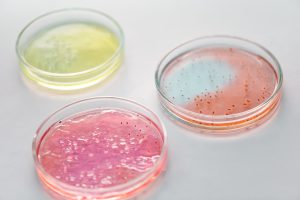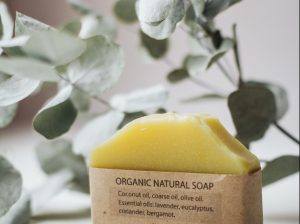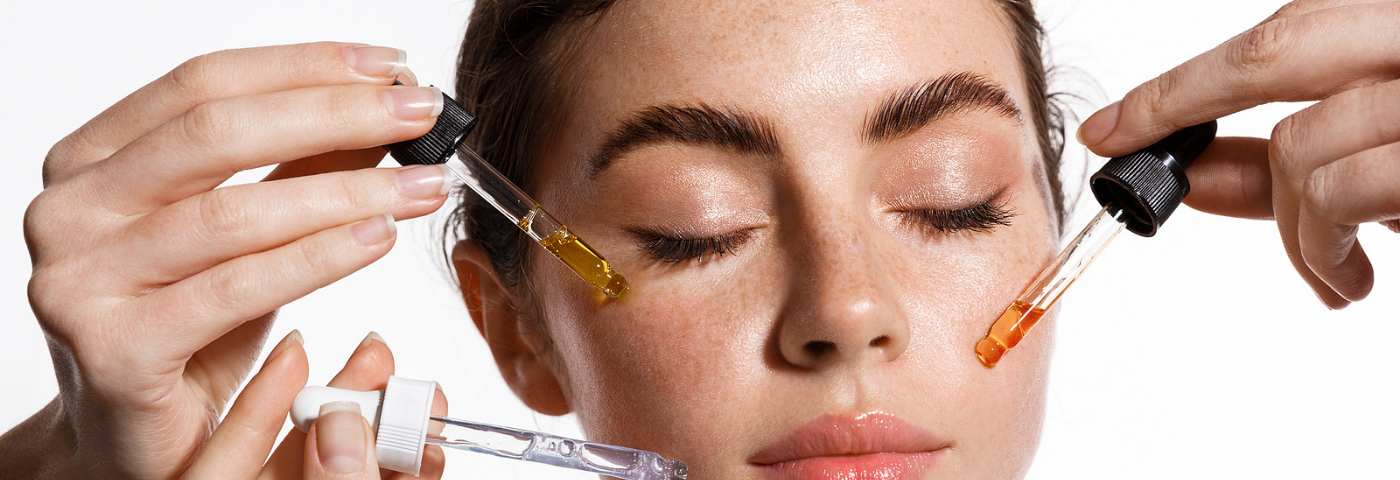The human body is home to more than one trillion bacteria and a natural collection of microorganisms that are responsible for the body’s internal immune system, as well as our protective skin barrier.
According to Alison Cutlan, Green Chemist and Co-founder of sustainable pro-microbiome skincare brand, Biophile: “Our microbes are responsible for protecting our skin from pathogens, controlling skin immunity, nutrient absorption and supporting our skin barrier. I like to say that skin microbiome is like the control centre or the ‘life force’ of the skin.'”
‘Microbiome’ was arguably the beauty buzzword of 2019, and two years on, microbiome-focused skincare continues to be widely cited as a top skincare trend. Searches on Google for microbiome exceeded 10,000 times every month in 2020. Demonstrating its position as an irreversible movement rather than a trend, the skin microbiome market is expected to grow at an impressive compound annual growth rate (CAGR) of 19% in the forecast period of 2020 to 2027.
Yet despite it being a hot topic within the beauty community, microbiome-friendly skincare is still working its way into the mainstream. Qualitative consumer research from DSM found that whilst beauty influencers are receptive to the idea of the skin as a living ecosystem, regular consumers are still somewhat apprehensive, still siding with the dominant narrative that bacteria is “bad”.
Michelle Connelly, Vice President of Merchandising and Planning at Credo says: “Consumers are familiar with the concept that they should take probiotics as an internal supplement but the connection to skincare is still vague. We’re very much gearing up for the microbiome to be the next hot topic.”
The important role of microbes

Microbes play a hugely important role in the health of our skin and are found to live in perfect symbiosis. However, the skin is continually subjected to stress from our diet and environmental factors such as pollution. In addition, when we wash away the microbes present on the skin’s surface through over-cleansing and over-exfoliating, the skin microflora is at risk of becoming out of balance. When this happens, skin conditions like eczema and psoriasis can emerge.
As witnessed with the popularity of probiotics for the gut microbiome, a wave of products with probiotics or postbiotics have hit the market in recent years, all claiming to rebalance the skin microflora. “Skin health has definitely been one of those trends we’ve seen in the beauty space where more derma brands and skin health brands are emerging now, as opposed to traditional skincare brands,” says Andrew McDougall, Associate Director of Global Beauty and Personal Care at Mintel.
Where to Discover the latest microbiome solutions
Offering a space to discover newly launched ingredients, in-cosmetics Discover is the perfect platform for brands and R&D professionals to discover the latest skin-boosting products. As pioneers in the field of microbiome exploration, Givaudan have leveraged its experience to craft a number of powerful actives for skin microbiota. For example, Yogurtene® Balance is an active ingredient that protects and rebalances the skin microflora to create younger-looking skin, while significantly improving skin hydration. On the Discover platform, users can also find more information about Sensityl™, a soothing, anti-inflammation active which lifts the mood, and Synchronight™ which acts as a guardian against harmful blue light.
Elsewhere on the platform, personal care professionals can discover the latest launch from INFINITEC. Its CBD oil balance gives a therapeutic vision of cannabidiol and the complete treatment of oily skin and its issues such as excess sebum, acne and inflammation, both on the skin and on the scalp. Also working across the skin and scalp, CutiBiome CLR™ from CLR Berlin recalibrates the skin as an ecosystem using a synergistic complex of lipophilic extracts from manuka, black pepper and magnolia and has been developed using next-generation skin microbiota research.
The opportunity for personalisation

Equal to the interest in this topic, the technology and scientific understanding of the skin microbiome is moving at an exceptional speed. For example, earlier this year Labskin introduced the world’s first personalised skincare subscription service, Skin Trust Club. Powered by AI, next-generation sequencing, and data from one of the largest skin microbiome data banks in the world, the technology allows users to identify skincare ingredients and a daily routine that suits their unique skin microbiome using a home analysis kit.
Skin microflora is unique to each individual, much like a fingerprint. As such, a need for personalisation presents an interesting opportunity for the beauty and personal care industry who can benefit from skincare routines curated for individual skin profiles. “Each microbiome is unique, which opens the pathway to individualized care routines. Its study can help reinvent cosmetics by better personalizing products, giving our consumers exactly what they need based on the ecosystem living on their skin” says Luc Aguilar, Director of Clinical and Biological Research for L’Oréal R&I.
Covid and the microbiome
Of course, we are all well aware that one of the biggest influences of late has been the ongoing pandemic. Since early 2020, consumers have been washing their hands and wearing masks at a frequency never witnessed before. Whilst these practices are useful in preventing the spread of coronavirus, stripping the skin of natural oils and bacteria has a direct impact on the skin microbiome and can exacerbate common skin conditions such as eczema and acne. “COVID has naturally led to a hyper-hygienic atmosphere. Our skin is not sufficiently equipped to handle these harsh treatments and it led to a lot of irritated and sensitive skin issues” says Alison Cutlan.
Stripping it back to nature
A huge part of maintaining a healthy microbiome is using fewer, but more targeted products that are not disruptive to the skin’s natural flora. This also reflects the wider trend of stripped back skincare routines – otherwise known as skinimalism – which has been further excelled by the pandemic. “Microbiome-specific skincare and slow, conscious beauty products that meet our new normal of using skincare as self-care will continue to gain traction” says Maureen Choi, Executive Director of Content and Curation at Violet Grey.

Of course, the skin microbiome movement has come about in tandem with the all-encompassing clean beauty trend that has led the industry for years. Products with natural ingredients are often some of the most sought after, and this is also true within the microbiome arena. One in-cosmetics Discover exhibitor leading this is Uute Scientific Oy with its microbial extract, Reconnecting Nature™. Containing billions of microbial particles, the product is made from natural soil materials and mimics the rich biodiversity found in forests. Research by Uute Scientific Oy shows that daily use on the skin stimulates the immune system and balances the unique microbiome.
The future of the microbiome
So, what is in store for the future? “I think probiotic skincare is here to stay now that we are learning even more about the protective skin barrier and the importance of replenishing the system,” says Tata Harper, founder of the eponymous skincare brand. Marie Drago, Founder of skin microbiome beauty brand, Gallinée agrees: “There’s so much to be done in the skin microbiome – its mind-blowing. You can re-do the whole of the beauty area taking into account the skin microbiome, and it’s going to be a revolution”.
A broader understanding of the skin microbiome and how it connects to the gut and the full immune system is still in its infancy, with more research needed to be done. But it’s not just bacteria… researchers are also looking into the skin virome – the viruses that live in and on the skin. “Most of the research up until now has focused on bacteria and fungi, and the effect of viruses is still poorly understood. However, this area is yet to be fully explored, and further safety and toxicity assessments are warranted” says Dr Radhika Bongoni, Head of Business Development at BaseClear.
These new technologies are allowing researchers to explore the skin microbiome in a way not done before. It is certain that this will accelerate discoveries in this space even further and lead to more of this science impacting consumer’s day-to-day lives. Julie O’Sullivan, postdoctoral researcher at APC Microbiome Ireland thinks “there’s going to be novel products targeting different areas we might not have thought of before”.
The events of the past 18 months have caused many consumers to change their skincare routines and hygiene practices and its likely this will fuel further research into maintaining a healthy skin microflora. Because of this, we can be sure it’s not just a trend. Now, more than ever before, consumers want to know how to strengthen their skin microbiome.
To access in-cosmetics Discover, visit the website today!

For more industry trends, have a look at the latest articles here, where we explore colour cosmetics, the evolution of suncare, biohacking and much more!


Researchers don’t yet know what specific strains of bacteria can improve the health of people with microbiome-associated diseases. But they do know that fecal matter transplants, which carry the full spectrum of gut bacteria from a healthy donor, can help patients suffering from certain diseases.